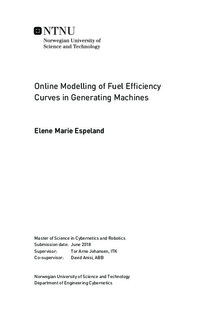Online Modelling of Fuel Efficiency Curves in Generating Machines
Master thesis
Permanent lenke
http://hdl.handle.net/11250/2616154Utgivelsesdato
2018Metadata
Vis full innførselSamlinger
Sammendrag
Gas turbines and diesel engines are important for generating energy in the process industry. Any optimization of the performance in such machines would contribute to reduce the emissions of greenhouse gases in the atmosphere as well as costs regarding fuel consumption. The current load distribution practice in the industry is to use the principle of "equal share". Some research has been conducted on the alternative approach with optimal load sharing, however, these methods are often based on general fuel efficiency curves, i.e., static curves from the manufacturer, leading to a sub-optimal solution.
In this thesis, four algorithms have been developed to estimate the individual efficiency curves in generating machines, that is the Brake Specific Fuel Consumption curves (BSFC). Classification of operational state with noise filtering, outlier detection and estimation of new curve parameters using least squares regression in real-time are included. The BSFC curves are modelled using a power series in Algorithm A and B; however, the logic of choosing which measurements to include in the estimation is different between the algorithms. Algorithm A is based on a First-In-First-Out logic, while Algorithm B includes weighting based on load, time and ambient temperature measurements. Algorithm C uses instead a second order polynomial to model the BSFC curves and only includes measurements above 40%. Algorithm C is further based on a FIFO logic as in Algorithm A. In addition, an offline algorithm was developed, Algorithm D, which estimate the initial BSFC curve using two models; power series and second order polynomial.
The proposed algorithms are simulated with data from site to study the system response using real operating conditions. The curves are updated every 30 minutes, and the estimated parameters are passed on to a load sharing algorithm developed in Jung (2018), calculating optimal set points regarding efficiency for the k number of generating machines. Finally, the results are discussed and compared to reveal strengths and weaknesses in the systems.
The optimal load sharing algorithm is currently only simulated using fixed BSFC curves, which resulted in cost savings of 2.48%. This result will be more reliable and possibly slightly different when the online estimation of the BSFC curves are applied, this is because of variations in the BSFC curves during the simulation interval due to ambient conditions.
Simulations of the online parameter estimation algorithms developed in this thesis indicate that there are small changes in the BSFC curves through the simulation interval. However, these small changes can have a considerable effect on the fuel consumption in these engines leading to cost savings and less emissions. Hence, online modelling of the BSFC curves should be applied in combination with a load sharing algorithm in the process industry.
